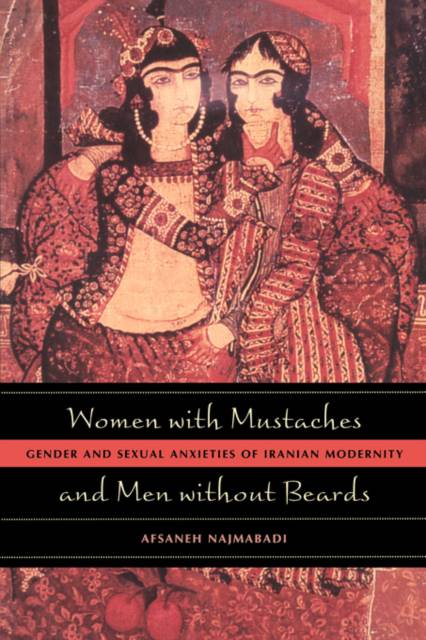
Je cadeautjes zeker op tijd in huis hebben voor de feestdagen? Kom langs in onze winkels en vind het perfecte geschenk!
- Afhalen na 1 uur in een winkel met voorraad
- Gratis thuislevering in België vanaf € 30
- Ruim aanbod met 7 miljoen producten
Je cadeautjes zeker op tijd in huis hebben voor de feestdagen? Kom langs in onze winkels en vind het perfecte geschenk!
- Afhalen na 1 uur in een winkel met voorraad
- Gratis thuislevering in België vanaf € 30
- Ruim aanbod met 7 miljoen producten
Zoeken
Women with Mustaches and Men Without Beards
Gender and Sexual Anxieties of Iranian Modernity
Afsaneh Najmabadi
Paperback | Engels
€ 59,45
+ 118 punten
Omschrijving
Drawing from a rich array of visual and literary material from nineteenth-century Iran, this groundbreaking book rereads and rewrites the history of Iranian modernity through the lens of gender and sexuality. Peeling away notions of a rigid pre-modern Islamic gender system, Afsaneh Najmabadi provides a compelling demonstration of the centrality of gender and sexuality to the shaping of modern culture and politics in Iran and of how changes in ideas about gender and sexuality affected conceptions of beauty, love, homeland, marriage, education, and citizenship. She concludes with a provocative discussion of Iranian feminism and its role in that country's current culture wars. In addition to providing an important new perspective on Iranian history, Najmabadi skillfully demonstrates how using gender as an analytic category can provide insight into structures of hierarchy and power and thus into the organization of politics and social life.
Specificaties
Betrokkenen
- Auteur(s):
- Uitgeverij:
Inhoud
- Aantal bladzijden:
- 377
- Taal:
- Engels
Eigenschappen
- Productcode (EAN):
- 9780520242630
- Verschijningsdatum:
- 25/04/2005
- Uitvoering:
- Paperback
- Formaat:
- Trade paperback (VS)
- Afmetingen:
- 169 mm x 239 mm
- Gewicht:
- 616 g

Alleen bij Standaard Boekhandel
+ 118 punten op je klantenkaart van Standaard Boekhandel
Beoordelingen
We publiceren alleen reviews die voldoen aan de voorwaarden voor reviews. Bekijk onze voorwaarden voor reviews.









